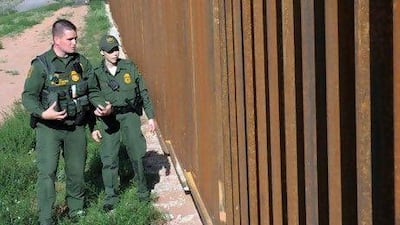State governments are trying to address a problem that is taxing both sides of the political divide and one that has already caused outbreaks of high emotion in the country
There are times when stock phrases and cliches are simply not enough. When pundits and television talking-heads discuss the debate over illegal immigration in the US they often call it "a political hot potato that divides America".
That does not quite cover what happened when Mike Delph, the Indiana state senator, recently proposed controversial legislation to enforce immigration law in the state. The results were e-mailed death threats to his family. This month, when an immigration hearing on Mr Delph's law took place in the Indiana State Capitol, it was held behind a cordon of police security.
Yet that is hardly unusual. Across the US local governments at all levels are struggling to deal with the issue of the country's estimated 11 million illegal immigrants, who now make up almost one in 20 US workers. Arizona last year triggered a political firestorm with its attempt to pass a tough anti-immigration law that critics said amounted to racial profiling.
The row sparked mass protests for and against and prompted legal action by the federal justice department. Yet many other communities are now trying to pass their versions of the law.
They are doing this because Washington has effectively washed its hands of trying to meaningfully tackle the issue. The last serious attempt occurred under George W Bush, who broke with his party's base to try to pass a law that would grant legal status to millions of illegals. But the effort was defeated by a conservative backlash.
Now the talk in Republican circles is all about defending the border with Mexico and sending all illegal workers back home.
But what of the Democrats? In his State of the Union speech last month Barack Obama, the US president, made a passing reference to wanting to pursue immigration reform.
But no one expects that to actually happen. Expect a few well-meaning words and no significant action.
So it is left to local governments to deal with the issue. On the one hand are those who want to see a cut in immigrants who they complain take much-needed jobs, provide a strain on social services and should not be rewarded for committing a crime by sneaking over the border.
They want existing laws enforced and, often, mass deportations.
On the other side are those who say much anti-illegal immigrant sentiment is tinged with racism because the vast majority of illegals are Hispanics. They point out illegal immigrants often pay taxes, do manual jobs that US labourers shun and just want the same chances that previous generations of immigrants had: to become middle class, hard-working, law-abiding Americans. They argue illegal immigrants actually pay much more in taxes than they cost in terms of welfare services.
The middle ground between these two view points barely exists and the debate is set to remain ossified. That suits some people, because few public figures are willing to admit that exploiting illegal labour has become a fundamental part of the US economy.
Those 11 million illegals are there because US companies - and by extension the US consumer - needs and wants them in the system.
The ability of firms, especially in agriculture and the service sector, to pay illegals low wages keeps profits high and, to some extent, prices down.
So, while many ordinary Americans may complain about illegal immigrants they will not want to pay more for their food and other goods?
The heart of the problem is not about illegal immigrants taking jobs no one else wants, or irrational fears over being swamped by people speaking Spanish. It is about the fundamental restructuring of the US economy in a fairer way that will come with a cost to every citizen. That is the debate that needs to happen.
Don't hold your breath.

